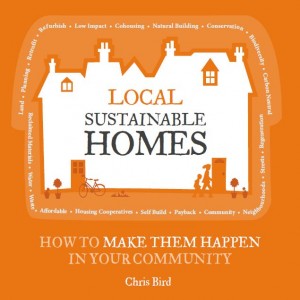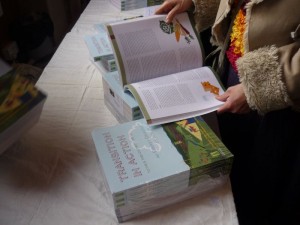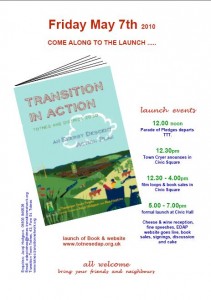Transition Culture has moved
I no longer blog on this site. You can now find me, my general blogs, and the work I am doing researching my forthcoming book on imagination, on my new blog.
Come find me at robhopkins.net
Archive for “Oral History” category
Showing results 6 - 10 of 15 for the category: Oral History.
1 Sep 2010
 Next week sees the publication of the next book in the Transition Books series, ‘Local Sustainable Homes: how to make them happen in your community’ by Chris Bird. More details to follow (including how to order your copy), but as a taster, here is my foreword to the book:
Next week sees the publication of the next book in the Transition Books series, ‘Local Sustainable Homes: how to make them happen in your community’ by Chris Bird. More details to follow (including how to order your copy), but as a taster, here is my foreword to the book:
In The Pattern of English Building, his seminal review of vernacular English construction techniques and the wide range of building materials that have defined English architecture – from flint and chalk to clay, oak and straw – Alec Clifton-Taylor wrote:
Read more»
10 May 2010
 The Totnes Energy Descent Action Plan received a fittingly rousing welcome into the world on Friday night in Totnes Civic Hall, following on from the earlier parade through town and its announcement by the Town Crier. Over a hundred people were treated to local Sharpham wine and nibbles in advance of the main event, buying copies of the EDAP and meeting friends. The audience had been promised, in the event’s poster, ‘fine speeches’, which put those speaking under considerable pressure! It turned out to be a fantastic and memorable event, one that welcomed the long-awaited EDAP into this community.
The Totnes Energy Descent Action Plan received a fittingly rousing welcome into the world on Friday night in Totnes Civic Hall, following on from the earlier parade through town and its announcement by the Town Crier. Over a hundred people were treated to local Sharpham wine and nibbles in advance of the main event, buying copies of the EDAP and meeting friends. The audience had been promised, in the event’s poster, ‘fine speeches’, which put those speaking under considerable pressure! It turned out to be a fantastic and memorable event, one that welcomed the long-awaited EDAP into this community.
Read more»
5 May 2010

Ladies and Gentlemen. It gives me the greatest pleasure this morning to launch the Totnes Energy Descent Action Plan website. The site makes the full version of the UK’s first EDAP freely available, invites comments and discussion, and will act as a dynamic portal for people to discuss the Plan and reshape subsequent revisions. It is the creation of the good folks at LumpyLemon, to whom we are greatly indebted. Highlights include the oral history section, Liv Torc’s poem in the section on stories, the Totnes Energy Budget, the photoshopped visions of the future and, if one might suggest a sample chapter, the food section. Copies of the printed EDAP are available here, and will be formally launched on Friday (do come). God Bless Her and All Who Sail in Her (sound of tinkling glass as champagne bottle is smashed against the side of the website)….
Read more»
27 Apr 2010
 The long awaited launch of the Totnes and District Energy Descent Action Plan will take place on Friday 7th May 2010 in the centre of town. Over the next few days I will be posting more about the Plan, a labour of love for the last year and a half, which has emerged as a quite extraordinary piece of work. You can now pre-order copies here. The official launch of the Plan will be on Friday May 7th, the day after the Election. Shoppers at the Friday market will be given some tasters of energy descent in colourful and musical spectacle as a parade of enthusiasts carrying pledges weave their way from TTT’s office in Fore Street up to the market and through the stalls at noon. The book will be on sale and a film loop of how the EDAP was created will be on show in adjoining venues during the afternoon. At 5pm there will be a formal launch with local advocates, book signing and cutting the cake in Totnes Civic Hall. All are welcome. Keep up with developments here.
The long awaited launch of the Totnes and District Energy Descent Action Plan will take place on Friday 7th May 2010 in the centre of town. Over the next few days I will be posting more about the Plan, a labour of love for the last year and a half, which has emerged as a quite extraordinary piece of work. You can now pre-order copies here. The official launch of the Plan will be on Friday May 7th, the day after the Election. Shoppers at the Friday market will be given some tasters of energy descent in colourful and musical spectacle as a parade of enthusiasts carrying pledges weave their way from TTT’s office in Fore Street up to the market and through the stalls at noon. The book will be on sale and a film loop of how the EDAP was created will be on show in adjoining venues during the afternoon. At 5pm there will be a formal launch with local advocates, book signing and cutting the cake in Totnes Civic Hall. All are welcome. Keep up with developments here.
Read more»
9 Mar 2010
 We’ve got so many wonderfully diverse and inspiring activities to show you this month…ideas for getting people involved and having fun! And they’re here for the sharing…
We’ve got so many wonderfully diverse and inspiring activities to show you this month…ideas for getting people involved and having fun! And they’re here for the sharing…
In the UK, TT Luton is organising a series of Grow Your Own events to relocalise food production and consumption, with discussions and a quiz to encourage people to grow their own fruit and vegetables, while Southend-on-Sea in Transition organised a day’s introduction to Permaculture with more events lined up that you’re invited to get involved with. TT Leek is getting hold of allotments and orchards so they can plant more trees and increase production of native British apple varieties, while TT Nailsea is sharing its gardening skills with other local people to increase self-sufficiency in food production, strengthen local resilience and encourage people to think more about their carbon footprints.
Read more»
 Next week sees the publication of the next book in the Transition Books series, ‘Local Sustainable Homes: how to make them happen in your community’ by Chris Bird. More details to follow (including how to order your copy), but as a taster, here is my foreword to the book:
Next week sees the publication of the next book in the Transition Books series, ‘Local Sustainable Homes: how to make them happen in your community’ by Chris Bird. More details to follow (including how to order your copy), but as a taster, here is my foreword to the book:




